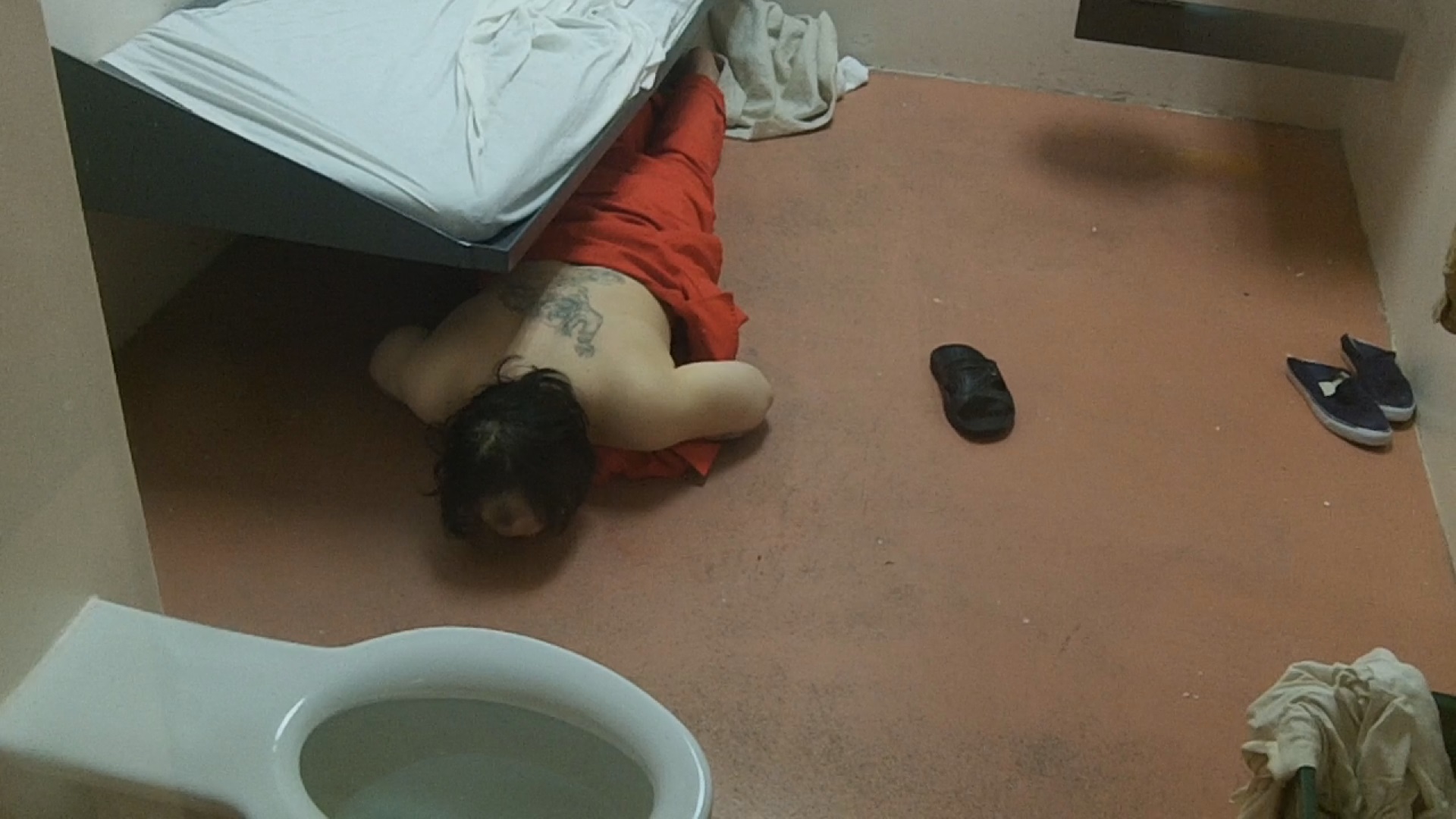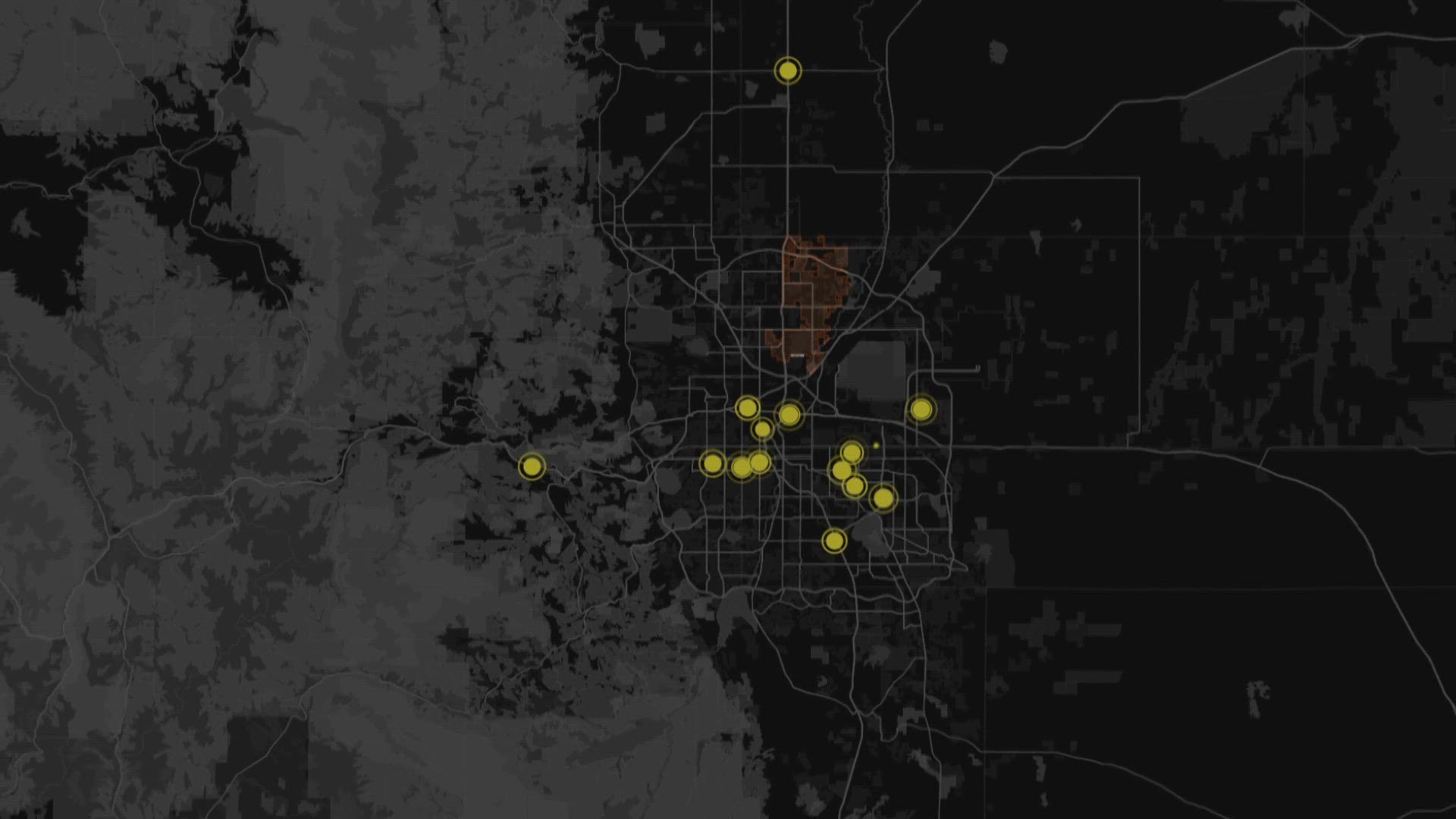KUSA – Minutes after a mentally ill inmate at a Colorado prison died from a preventable illness, corrections officers and medical staff continued to crack jokes and carry on routine conversations, seemingly oblivious to the fact the inmate had passed away in the room right next to them.
Christopher Lee Lopez was two days removed from a nine-and-a-half month stint in solitary confinement when he died while wearing restraints inside the intake area of San Carlos Correctional Facility on March 17, 2013. The Pueblo County Coroner said he died of "severe hyponatremia" or low blood-sodium level.
Approximately six hours of video obtained by 9Wants to Know highlight what happened to Lopez during the last hours of his life. The video, originally recorded by Colorado Department of Corrections staff on the morning of Lopez's death, form the basis of a lawsuit filed in federal court in Denver on Thursday.
Among other things, the video shows Lopez having a grand mal seizure while sitting in a restraint chair less than four hours before his last breath. While the seizure lasts less than a minute, the video shows Lopez slumping in the restraint chair for another 34 minutes before prison staff take him out of the chair and place him on the ground.
Christopher Lopez was no angel. His mother admits that.
"He was hyper as a boy. He was active in everything and had a lot of friends," she said.
His father died of stomach cancer when he was nine, and he dropped out of school in the seventh grade.
In 2005, according to the lawsuit, a Licensed Professional Counselor diagnosed Lopez with schizophrenia while he was incarcerated at the Weld County Jail. At the time, the counselor said Lopez "believes that he's Jesus Christ."
The lawsuit also says Lopez suffered "more than a dozen psychotic episodes" and found himself "involuntarily committed to the Colorado Mental Health Institute at Pueblo 12 times."
In 2007, while serving a two-year prison sentence for trespassing, he assaulted a corrections officer. That gave him an additional four-year sentence.
In May 2012, prison officials sent Lopez to solitary confinement at San Carlos Correctional Facility. He remained in solitary until March 15, 2013.
Two days later, corrections officers found him lying on the ground right next to his bed. He wasn't saying anything, but at least one of the officers believed Lopez to be "faking it," according to a state review.
"What's going on, man? Can you talk at all?" voiced one officer standing outside Lopez's cell. "Try to get yourself over by the door."
When Lopez failed to move, officers broke out a video camera and started recording Lopez through the food tray slot in his door.
"Why don't you just come over to the door so we can take care of this, so we can give you the medical treatment that you need?" said the officer.
The time was approximately 4:25 a.m. on March 17, 2013.
By 4:45 a.m., officers in helmets, face masks and pads were ready to enter his cell in order to place the "non-compliant" inmate in "special controls."
Special controls are generally reserved, according to DOC policy, for inmates "that have become violent or destructive to themselves or others." While Lopez was exhibiting no sign of being "violent or destructive," staff at San Carlos believed Lopez's inability to obey their commands left him open to it.
The cell extraction went smoothly, according to the officers involved. Records obtained by 9Wants to Know suggest Lopez "was promptly placed in restraints and assisted into the transport chair." Once in the restraint chair, Lopez was transferred to the intake area for additional observation.
Around the same time, officers in another part of the prison were undergoing a debriefing for the cell extraction, Lopez arched his head back and started having a seizure. The time was approximately 5:38AM.
The seizure, according to a review of the videotape, lasted approximately 48 seconds.
Because his shoulders were not restrained, Lopez immediately slumped in the chair following the seizure. Thirty-four minutes later, staff entered the room and lifted him off of the chair. It's not clear if anyone saw the seizure as the camera was on a tripod and appeared to be unmanned at the time.
Officers placed Lopez on his side in the cell, but it didn't take long before the 35-year-old was lying face down.
At one point, one of the officers makes an off-color joke.
"Holler if anything changes," says one officer.
"Like, if he stops breathing? asks his colleague.
At 7:30 a.m., a nurse entered the cell to give him two psychotropic medications. A state report found the nurse "failed to take [Lopez's] vital signs or to perform a nursing assessment." That report concluded the failure to do so became "a contributing factor in his death."
David Lane, the attorney representing Lopez's family, told 9Wants to Know sodium deficiency can be the direct result of exposure to psychotropic medications. He added it's still not clear what caused Lopez's death. Regardless, he said, the inability of multiple staff members to see that something was seriously wrong with Lopez remains inexcusable.
"The Department of Corrections treated Christopher Lopez in a way that an animal should not be treated," said Lane.
At 9:08 a.m., according to a review of the videotape, Lopez takes in what amounts to his last meaningful breath.
It will take another 18 minutes before anyone notices he has no pulse.
In between, staff in a room next door periodically have conversations with Lopez and with themselves.
"What are you doing? Why are you doing this?" asks the on-call mental-health clinician as she props her head next to the cell's food slot.
"I can see you breathing," she adds.
The state review will later determine that was impossible.
"Is he still on the floor?" asks a corrections officer.
"Uh huh," says another.
"He likes it on the floor," says another.
At one point, officers start talking about Disneyland. A few minutes later, staff decides it's time to take Lopez out of special controls.
A little after 9:20 a.m., staff reenters the room and takes a lifeless Lopez out.
At 9:24 a.m., or approximately 18 minutes after that last meaningful breath, an officer asks if Lopez has a pulse.
"We need to check this guy's pulse," he says.
A few minutes later, staff at San Carlos attempts CPR, but by then it's too late.
The death of Christopher Lopez happened two days before the murder of Colorado Department of Corrections Executive Director Tom Clements. 9Wants to Know has learned Clements was briefed on the death before he died and ordered a review.
Lopez's mother says she has never received an explanation of what happened from anyone at DOC.
"How could [they] be so heartless to just let another human being die?" she asked.
This week, 9Wants to Know learned three medical staff members at San Carlos were fired as a result of their actions and an additional five staff members received some sort of reprimand. The punishments had never been previously disclosed.
"I think DOC, when this happened, kept their fingers crossed that it was all going to disappear," said Lane. "We are going to make DOC very, very sorry that this happened."
"How is it possible that in a facility like this eight people who are responsible for Christopher Lopez can't pick up a phone and call for a doctor?" he added.
The lawsuit suggests as many as 16 staff members witnessed Lopez the morning he died.
"If you don't want to take care of violent, dangerous people, then don't work in a prison. If you're going to work in a prison then do your job and treat people like human beings," he said.
A spokesperson for DOC declined numerous invitations by 9News to discuss the case on camera. Citing the lawsuit, DOC decided instead to issue a written statement to 9News. It reads:
"The Colorado Department of Corrections offers its condolences to the family and friends of Christopher Lopez. Although, we realize no apology or explanation will replace the loss to his family, we do wish to convey to the family and to the public that the Department does not condone the actions or omissions of the employees involved, which were well outside of the Department's established training, policies, and practices. After this tragic event, the Department thoroughly investigated this matter and swiftly took action against those individuals responsible including termination of a number of those employees directly involved. Within ten days, the Department put four employees on administrative leave. In May of 2013, three of those employees were terminated. An additional five received corrective and/or disciplinary action. After this event, the Department also took steps to ensure that all of the employees at the affected facility received additional focused training on effectively and positively managing these critical events. While again, these facts do not mitigate the loss to the Lopez family, we wish to remind the public that the acts of certain individuals should not detract from the thousands of dedicated Department employees who vigilantly perform their duties each and every day to ensure the safety of the public and offender population."
The lawsuit seeks unspecified damages, but Lane's intentions appear quite clear. "There has to be more than hand wringing and finger wagging when something like this happens," he said. "His death was eminently preventable. All they had to do was get medical help for him, and they couldn't be bothered," he said.
Lane said he would like the Pueblo DA to consider charging DOC staff members with criminally-negligent homicide.
9NEWS Legal Analyst Scott Robinson called that a "long shot."
If you have information on this case, contact Chris Vanderveen at chris.vanderveen@9news.com.
(KUSA-TV © 2014 Multimedia Holdings Corporation)


